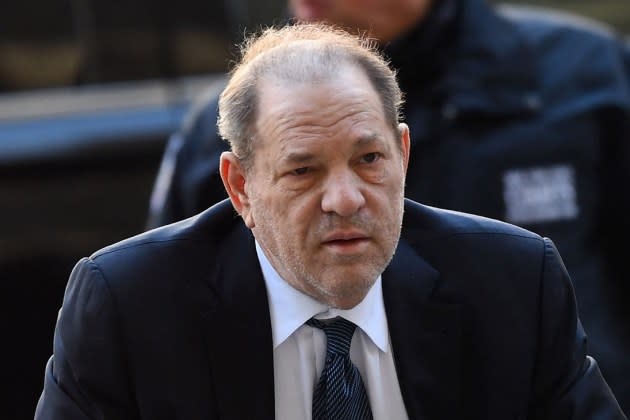Is There Still Hope for #MeToo Justice?

We all know he’s guilty — even the New York appeals court majority that ordered a new trial for Harvey Weinstein knows it. That makes the narrow, 4-3 reversal of Weinstein’s conviction all the more enraging.
Anyone who has ever watched a cop show knows how difficult it is to get a conviction in a sexual assault case. Yet the court majority found that the trial judge made an “egregious” mistake in letting three women testify about alleged sexual assaults even though their claims were not part of the charges against Weinstein (known as “Molineux witnesses”). Without that testimony, the majority concluded that Weinstein might have walked.
More from The Hollywood Reporter
Dissenting Judge Anthony Cannataro wrote that the decision was “endangering decades of progress in this incredibly complex and nuanced area of law.” What message does the New York appeals court ruling send? In a new trial, the women whose testimony achieved the seeming miracle of a conviction will be asked to relive their experiences. And how are other sexual assault victims watching this display likely to react?
Our systems have failed us so epically for so long that predators like Weinstein and Bill Cosby pursued their victims unfettered for years. Donald Trump, found liable for rape in the E. Jean Carroll case, is still the GOP’s choice for president.
For years, Weinstein was too powerful to touch. When his power ebbed, it wasn’t the cops or prosecutors who brought him down. The reckoning happened when journalists finally found enough brave women to speak on the record.
Everyone remembers how The New York Times and The New Yorker exposés set off an earthquake followed by a cultural tsunami. At The Hollywood Reporter, as at other publications, the phones rang relentlessly. Many accusers were frightened but also seething, not only over Weinstein’s long predatory career but also over the fact that Trump was in the White House despite credible allegations of sexual misconduct, with a recorded confession by way of the Access Hollywood tape, no less. Encouragingly, it wasn’t only women who made those calls. Sometimes men who had witnessed misconduct toward women were the whistleblowers.
Many, if not most, of those accused lost their jobs. However, in some cases, the companies that employed them were loath to take action. THR published several stories, for example, about alleged assaults committed by Extra host A.J. Calloway — accusations spanning from 2003 to 2013. Women had filed complaints with police in New York, New Jersey and California. Calloway was arrested just once in New York but walked away on a technicality. After THR published the first allegation in 2018, Warners took a year — during which more accusers came forward — to part company with him. (Calloway has denied any wrongdoing.)
It wasn’t long before some people began arguing that #MeToo had gone too far — and maybe in a few cases it had. But it was striking how allegations arose in academia, in the restaurant and fashion industries, in the arts. With the power of reporting — of necessity, deeply researched reporting — to end careers, it seemed possible that times were changing. But still, for the most part, victims could only get a meaningful response from the press rather than their employers or their guilds.
As time went on, the calls became fewer and further between. It’s hard to say whether the workplace culture had changed or had simply reverted to the status quo ante. The hope is that men and women will continue to fight when confronted with bad conduct, even though the stakes are high and the outcome is hardly guaranteed.
More than 20 years ago, I asked Weinstein if he was worried about some reporter finally getting the story of his predations on the record. “They’ll never get me,” he said. He knew he had it all stitched up, with his deep pockets, his lawyers and the signatures on nondisclosure agreements. He knew that others were frightened about what he could do — and in some cases did — to their careers.
Now New York has failed women once again, but Weinstein still faces a 16-year sentence for rape in California. Thankfully, the law here is not so outdated and misguided as it now stands in New York. Courts allow prosecutors to introduce evidence that demonstrates a defendant’s propensity to commit sex crimes, even when those allegations aren’t part of the crimes charged. California attorneys believe Weinstein will have a tough time getting his rape conviction overturned.
But think about this: In 2022, after Bill Cosby’s conviction was tossed, the Supreme Court declined to hear the case. If Weinstein’s conviction is upheld in California after being overturned in New York, might the Court be inclined to take up the constitutionality of Molineux-type witnesses in future sexual assault cases and settle the matter?
Impossible to predict. But if that were to happen, what are the odds that Clarence Thomas and Brett Kavanaugh would recuse themselves?
Best of The Hollywood Reporter
Solve the daily Crossword

